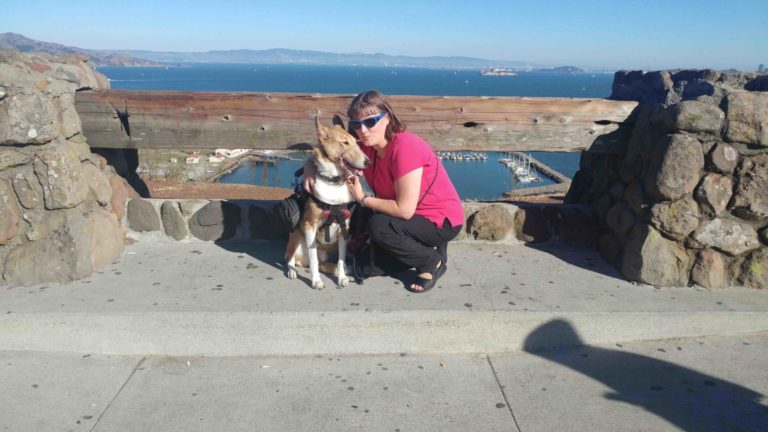A Franklin Pierce College Graduate, Kristin Hartness leads Canines for Disabled Kids — an organization working to “increase independence for children with disabilities and their families by promoting service dog partnerships, understanding and awareness throughout the community.”
Having lived with multiple sclerosis since the age of 16 and having thus experienced firsthand the independence a service dog can bring to an individual, Kristin is a strong advocate for the value of assistance dogs in the lives of people who live with disabilities.
She has been speaking about this for years now, both nationally and internationally, and has recently accepted our invitation to share her thoughts with us as well, and to participate in our Shape Your Future series.
Here is what Kristin and I spoke about.
Kristin, you have had multiple sclerosis since the age of 16. You finished high school and went to college. From the outside, you seem to have lived a very normal life. How did your illness affect you at the time? How has it influenced your career path?
Kristin Hartness: Multiple sclerosis (MS) has altered my life more significantly than I often admit. First, getting a diagnosis was great. I went through testing for a number of things that were scary or came with death sentences; MS was something I could live with. I choose to live.
I was relapsing/remitting MS for many years, during which I adjusted how I lived: going out only when I felt good and avoiding activities when I did not. I was going to have good days and bad. I determined to ignore the bad. I never wanted to have people say my MS prevented me from doing something.
I am determined to do what I can today and not wait to find out if I can’t do it tomorrow. I have ridden a snowmobile and a ski jet (did not like either). I don’t like skiing but, I tried it. I love travel and am thrilled to travel for work, even though it exhausts me. I have traveled to Europe, Ireland, Hawaii, all over the contiguous United States, Canada, Bermuda, Bahamas, and look ahead to more.
I can’t wear high heels any more but I don’t wear sneakers!
MS led me to a career I never thought of and was not thinking of when I turned down the path. I choose to add a service dog to my tools in 2001. Laddie changed my independence so much that I could not stop talking about what he did. A year later the executive of the program who trained Laddie asked me if she could put my name forward for a job with a small nonprofit. Seventeen years later — I’m still here!
I look at opportunities and options that I never would have experienced had MS not influenced and altered my body. I like to think I’m a better person than I might have been. I’m not sure how true it is but I know I like who I am and that is very important.
What has been the most joyful event of your life so far?
KH: This is a hard question for me. My life is filled with joy. Receiving my first service dog, and my second and my third fill me with joy and excitement about what we will do together. Worships with other Episcopalians when I travel gives me joy. Having been married and blessed to be a step-mother of three for ten years brought me joy. The joy of having a wonderful family and friends who support me in all I do is ongoing. All joy is balanced by sadness but then comes joy again. I cannot claim one event or moment as the most joyful. There is too much joy and it flows over the sadness helping me get to the next joy-filled event.
Since 2001, you have had a dog who assists you in your daily life. How has your dog benefitted you and why is it important for disabled people to receive such support?
KH: My dogs changed my independence. They helped me reclaim the independence MS could have taken. I was falling more than once a week before I got Laddie. I had stopped going places because I was afraid I would fall. I did not like to go out alone because I did not know how I would get help. I did not tell people because I did not want to be pitied. I did not want people to do things for me. I wanted to do things on my own. I only fell twice in the first 6 months I was partnered with Laddie. Only Twice! He was trained to provide balance and counter balance to my gait, he was trained to retrieve items which reduced my fall risk, and he was trained to help me recover from a fall – providing the help I needed without depending on another human being. MS changes how my body works inside and out. My service dogs provide the perfect tool to help me keep moving.

It is import people with disabilities get the support they need so they (we) can stay involved in life! Support comes in many way at different times. Emotional support provided by family and friends helps us over the bumps. Having people who can hold your hand during a treatment, a trip to the ER, or eat ice cream with you just because today was a bad day is critical in keeping your energy up so bad moments are just moments you got through and not moments that hold you in place. Physical support like braces, eyeglasses, hearing aids, wheelchairs, canes, walkers and service dogs give us greater independence to do what we want to do when we want – not when someone has time or when they think we should do the activity. These tools help us move through life on our terms. These hearing aids give us access to the world around us and help us claim our space in it. We are not extensions of other people. We are not something brought along by able bodied people. We are individuals with a lot to experience, a lot to learn, a lot to live. Support of all types help us become our best.
Service dogs are especially dear to me. They provide independence like no other tool. They are always ready to work – even when the power goes out. They are trained to help with many tasks – not just one. They give you the bonus of a companion. When they are the right tool they are perfect!
Throughout history, adults and children have suffered from disabilities. Is there a tradition of assistance animals we need to rediscover to make the life of disabled people easier?
KH: Animals, especially dogs, have worked with people from the beginning of time. Before the formal development of service dogs, I believe people have used their pets to compensate for disabilities. I think these are behaviors that encouraged the growth and creation of the service dog industry. People with hearing loss learned to watch their dogs to see where sounds were coming from helping them to be more aware of their quieting environment. People taught their dogs to pick up dropped items for play, convenience and to compensate for the inability to bend over and pick up the item. Dogs want to be valuable to us. Dogs study us and learn to do things that we value and reward them for. Alerting to the phone ringing or a knock on the door, picking up dropped items are appreciated by their owners but when the owner is disabled and cannot do those things for themselves, having your dog do it builds a bond and strengthens an individual. I think having animals, specifically dogs, in our lives makes us better people. Building on that by teaching dogs to do specific things for specific needs of a person with a disability is the obvious way to go. Is that a tradition of assistance animals? Not really but it is rediscovering the value of animals I our lives that will help communities respect and embrace those that become service animals.
In relation to our Shape Your Future video series, I would like to ask you one more question, in fact the one to top them all and to guide all of us:
“How do you shape your future?”












